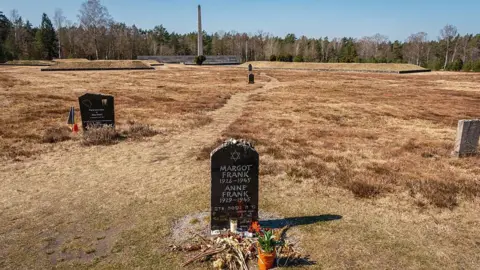BBC Information at Bergen Belsen
 AFP
AFPThere had been rumours. There had been aerial images. There had been the written testimony of some escapees. However it took liberation for the revelation of the stunning actuality of the Nazis’ focus camps.
Nowhere was this extra true than when British and Canadian troops superior on the camp at Bergen-Belsen, close to Hanover, in April 1945.
A truce with native German commanders enabled them to enter and not using a battle. They had been met with a stomach-churning vista of loss of life, a torrid panorama of human struggling.
The troops calculated there have been 13,000 unburied corpses. An extra 60,000 emaciated, diseased, spectral-like survivors stood and lay amongst them.
To mark the eightieth anniversary of the liberation of Belsen, greater than a thousand survivors and households attended commemoration occasions on the camp on Sunday.
Row after row, they listened to folks recount the horrors of the camp.
They included Mala Tribich from London, 14 then, 94 now. Belsen was, she says, “a spot of skeletons, the place the lifeless had been piled up and the dwelling shuffled round… There was loss of life all over the place”.
Mala stated she noticed guards pulling the corpses alongside on blankets or by their limbs.
One other survivor, Esther Alice, who was aged 11 on the time, recalled the “horrible” reminiscence of her mom dying in her arms in hut 221.
The solar shone down on Sunday’s spectacle, however Belsen nonetheless has the capability to sit back.
“To me, Belsen was the last word blasphemy,” wrote one British soldier, Michael Bentine, who, after World Battle Two, went on to develop into a well-known entertainer.
Different chroniclers, film-makers and diarists struggled to convey in phrases and photos the scenes that made undesirable incursions into their minds.
The BBC’s Richard Dimbleby was the primary broadcaster to enter the camp shortly after liberation. In his landmark broadcast he included the phrases: “At the present time at Belsen was essentially the most horrible of my life.”
Belsen’s notoriety quickly stood out, not simply due to the chillingly vivid accounts of journalists, troopers and photographers, whose testimonies had been despatched all over the world, however as a result of it was discovered with all its grotesqueness intact.
Different camps additional east, just like the loss of life camps of Treblinka, Sobibor and Auschwitz, had both been destroyed by the Germans to cover their crimes within the face of Soviet advances or emptied of their inmates.
At Belsen, the huts, the barracks, the proof, remained.
At Belsen, there have been witnesses, perpetrators, victims.
It was the place a lot of these jap focus camp prisoners ended up. Overcrowding led to dysentery, malnutrition and typhus.
There have been no fuel chambers at Belsen. It was Nazi cruelty and incompetence that accounted for the five hundred deaths a day that the camp endured.
And most of it got here within the closing weeks of the struggle, effectively into April 1945.
 FOCKE STRANGMANN/AFP
FOCKE STRANGMANN/AFPBecause the Third Reich collapsed and freedom got here to these in different occupied territories, the dying continued at Belsen: between 50,000 and 70,000 folks in complete, greater than 30,000 of these between January and April 1945.
Round 14,000 of the prisoners died after liberation, their digestive techniques unable to deal with the extremely calorific, wealthy sustenance provided by well-meaning cooks and medics.
The overwhelming majority had been Jews, with Soviet prisoners of struggle, Sinti and homosexuals amongst different teams to be engulfed by the horrors of the camp.
Sunday’s anniversary was a commemoration to those that by no means left right here, without end to be part of a criminal offense that continues to arc its means throughout historical past.
Among the many survivors and kinfolk who attended the occasion had been 180 British Jews. Their journey was organised by Ajex, the Jewish Navy Affiliation.
Wreaths had been laid by Ajex veterans, in addition to dignitaries, together with Deputy Prime Minister Angela Rayner.
A psalm was learn by UK Chief Rabbi Sir Ephraim Mirvis.
They did so amid the verdant environment of Decrease Saxony, the place the watch towers, fences and buildings have gone.
That is as a result of, ultimately, to comprise illness, the British troopers determined they needed to burn the huts at Belsen.
And so, at this time, little stays. A customer centre is a focus, close to to the place a handful of memorial stones and crosses have been erected.
The inscription on one reads: Hier ruhen 5,000 toten – right here relaxation 5,000 lifeless.
It’s simply one of many graves, one of many recollections, that hang-out the grassed panorama.

